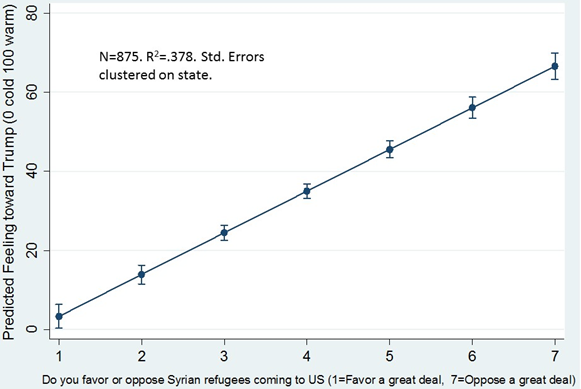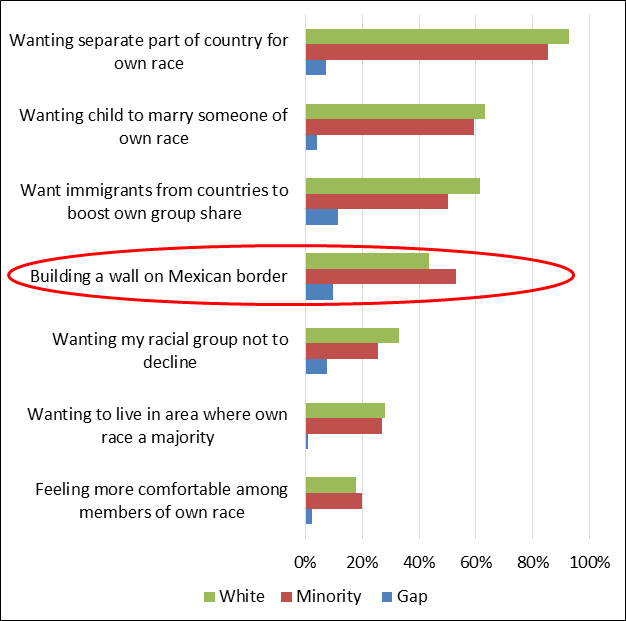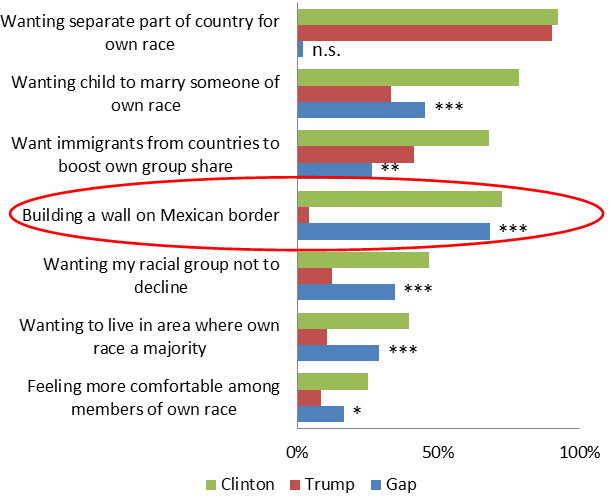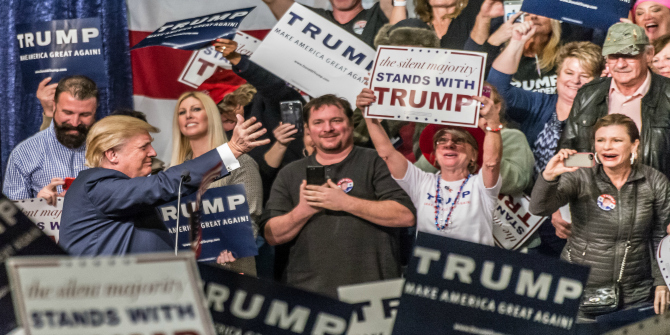 In recent days, President Donald Trump has signed an order to construct his long-promised border wall with Mexico, and another which would stop Syrian refugees from entering the US and placed a 90-day ban on immigrants from seven Muslim countries. Eric Kaufmann writes that Trump’s Muslim ban is racist as it is based on an irrational fear of Muslims, but the Wall is not, as it normal for states to wish to control their borders. It is important, he argues, that we should not apply the label “racist” indiscriminately, or it will become harder to spot real racism when it appears.
In recent days, President Donald Trump has signed an order to construct his long-promised border wall with Mexico, and another which would stop Syrian refugees from entering the US and placed a 90-day ban on immigrants from seven Muslim countries. Eric Kaufmann writes that Trump’s Muslim ban is racist as it is based on an irrational fear of Muslims, but the Wall is not, as it normal for states to wish to control their borders. It is important, he argues, that we should not apply the label “racist” indiscriminately, or it will become harder to spot real racism when it appears.
Trump’s wall is not racist, but his ban on immigration from seven Muslim countries is. It’s extremely important to make the distinction. At a time of rising polarization between liberals and conservatives, we need to guard a rational centre which condemns racism but doesn’t smear reasonable differences of opinion.
Donald Trump released two bombshells this week. First, he signed the order to construct a border wall with Mexico. Then he ordered a halt to the admission of Syrian refugees and a 90-day ban on immigrants from a series of Muslim countries. Both actions were condemned by progressives as racist, stoking a predictable counter-reaction from conservatives. But if we want to defend reason and liberal democracy, it’s important to reserve the racist charge only for clear violations. This won’t change Trump’s thinking, but it could draw moderate conservatives and liberals together. To do otherwise is to invite conservative resentment and a politics of unreason.
Few issues polarize like Trump’s Wall and Muslim immigration. Back in January, during the Republican primary, the American National Election Study (ANES) asked Americans whether they favoured Syrian refugees coming to the United States. This question split the Trumpians from other Republican and Democratic candidates better than any of the many questions in the survey. You can see the strength of the relationship in Figure 1, restricted to white Americans, which controls for a person’s state and whether they are a Republican, Democrat or Independent. Recall that this was a tight primary race with many competing Republican candidates. Even so, those most in favour of admitting Syrian refugees scored him 66 out of 100, and those most against only 5 out of 100.
Figure 1 – Trump rating and opinions on Syrians by US whites

Source: 2016 American National Election Study pilot survey.
In addition, most liberals view both policies as racist. In December, after Trump’s election, I ran a small pilot survey on Amazon’s Mechanical Turk (MTurk) platform as part of a Birkbeck College-Policy Exchange project. I asked a sample of around 200 people what they consider racist or not. MTurk has a strong skew toward white liberals, but this shouldn’t affect comparisons between groups.
The first point is that whites and minorities largely agree on what is, and is not, racist. Look at the results by race in Figure 2. Notice how small the differences are between the white and minority responses (green and red bars). None of the gaps (in blue) are significantly different from chance, including views on whether the Wall is racist.
Figure 2 – Which of the following do you consider racist? Whites v. Nonwhites (% saying ‘racist’)

Source: Amazon Mechanical Turk survey, Nov. 29. N=46-56 minorities, 119-139 whites. Excluding don’t knows.
Now let’s see what happens when we compare Trump and Clinton voters in Figure 3.
Figure 3 – Which of the following do you consider racist? Trump v. Clinton voters (% saying ‘racist’)

Source: Amazon Mechanical Turk survey, Nov. 29. N=117-144. Excluding don’t knows. *Statistically significant at the p<.05 level; **p<.01; ***p<.001. N.S. – not significant.
All of a sudden, big, statistically-significant canyons open up. 72 percent of Clinton voters, but only 4 percent of Trump voters, think the Wall is racist. This is not just asking people whether they approve of the Wall or not, but concerns racism, one of the most serious accusations you can make in American society. In short, 72 percent of Clinton voters are accusing Wall supporters of racism. In a Birkbeck-YouGov-Policy Exchange follow-up survey of 2600 Americans, the same pattern of partisan divisions vastly exceeding racial ones emerged over whether it is racist rather than racially self-interested for whites to want less immigration. Jon Haidt notes that group loyalty is part of conservative, but not liberal, moral psychology – and Figures 2 and 3 clearly show that Trump and Clinton voters, regardless of race, divide sharply over whether favoring one’s group is racist.
Who’s right?
The Wall
Let’s begin with the Wall. I define racism as an irrational fear or hatred of another race, a sense of racial superiority or a desire to maintain race purity. By this yardstick, Trump’s comments suggesting Mexican immigrants are disproportionately rapists are racist. But while Trump’s comments are racist toward Mexicans, there are many reasonable motives for constructing a more extensive border wall. For instance, the head of the union representing US Border Patrol staff argues that this will greatly improve security. It’s normal for states to want to control their borders for a whole host of reasons, including sovereignty, security, economics and cultural demography. The US-Mexico border is the only part of the world where a first-world economy shares an extensive land border with the developing world. Europe, Britain and Australia are all insulated by moats which are much easier to control and harder to traverse. When people try to cross, they are easy to apprehend and send back to Turkey, Calais or Nauru.
Since 1970, millions have crossed the US-Mexico border in search of a better life. This is a major reason why a third of babies born in the US are now Hispanic, up from a few percent in 1970. Yet if Britain, where I live, or Canada, where I’m from, had hundreds of thousands entering illegally each year, there would be an outcry.
Mexico is now a middle-income country with a birth rate similar to America’s, so as many leave as enter the US. But migrants from Central America, Africa and Asia are replacing Mexicans in the flow across the border. Despite Trump’s racist statements about Mexicans, many who make the case for building or extending the Wall do so on the basis of legitimate motives, rational thought and evidence.
Muslims
Banning Muslims from certain countries, or Syrian refugees, is an entirely different matter. This is racist because it’s based on an irrational fear of an ethno-cultural group. While Muslims are not an ethnic group, all but a few converts are Muslim because they were born into Muslim ethnic groups. Why is fear of Muslims irrational? I approach this like an insurance adjuster: is the risk of a Muslim immigrant harming an American appreciably higher than the risk of a non-Muslim immigrant doing so? There should be a presumption against discriminating against cultural groups, but this is not absolute. I have no problem excluding dangerous ones like ISIS or Aum Shinriko. On these grounds, Muslims simply don’t qualify.
Shias have never committed terrorism on western soil. A Sunni Muslim from a war-torn country is more likely to commit a terrorist act than a non-Muslim and less likely to kill someone driving drunk. On both counts, the difference is infinitesimal – nothing like the risk of admitting men between the ages of 18 and 30 into the US, who account for almost all violent crime. If people want complete security, then ban young men. Banning Muslims from war-torn countries is a disproportionate response, not based on rational calculation of risks, but on an irrational fear of a cultural group, which is racism.
Partisan lobbyists and the media will always make their case in a biased way. But when mainstream news outlets chastise conservative unreason while failing to criticize liberals who accuse Wall proponents of racism, they betray the cause of reason, and, by extension, a civilized centre ground. Taboos such as racism are meant to induce a gut, emotional response of disgust. This should be reserved for clear cases. As David Goodhart writes, when the racism label is applied indiscriminately, this de-sensitizes people to this charge. This permits real racism to be smuggled past conservatives who may once have resisted it.
It also creates resentment and polarization. Those who feel a wall is justified but are uneasy about Trump’s remarks about Mexicans are pushed into the hardline corner because there is no trusted centre to present a nuanced rather than tribal perspective.
Trump seamlessly intertwines racist policies such as banning Muslims from certain countries with legitimate conservative positions such as the Wall. His #NoWallNoBan adversaries label everything racist, bundling Trump’s disgusting and merely conservative policies together. Right-wing media respond accordingly, fueling the spiral of Us and Them.
It’s time to elevate the discussion.
Featured image credit: Joe Piette (Flickr, CC-BY-NC-2.0)
Please read our comments policy before commenting.
Note: This article gives the views of the author, and not the position of USApp– American Politics and Policy, nor of the London School of Economics.
Shortened URL for this post: http://bit.ly/2juLRbR
______________________
 Eric Kaufmann – Birkbeck College
Eric Kaufmann – Birkbeck College
Eric Kaufmann (@epkaufm) is Professor of Politics at Birkbeck College and is writing a book about the White majority response to ethnic change in the West (Penguin).







Surely the wall in racist as it divides historic New Spain, later Mexico, into halves – one that remains unoccupied and the other occupied by Anglo-Americans since the Invasion of Mexico.
That said, there was a top secret ‘news-out’ on Iranian student attacks against multiple US air bases when deposed Shah Pahlevi was given asylum in America.
East Germany only wanted to control its borders too.
With so much in this article that is analytically insensitive it’s hard to form a measured response. I’ll stick to the main argument.
The article is saying that, because there exist parties to the present-day border wall discussion in the US that may have non-racist motivations, the entire undertaking of wanting to construct a wall must be non-racist, even though those parties to the discussion that (1) currently steer policy and (2) dominate that public debate are openly racist. (“Trump [-] [declaring] Mexican immigrants are [-] rapists…” – paragraph 10 in this article.)
By this logic wanting to build walls on borders anywhere is non-racist regardless of the intellectual context that may frame and drive such effort.
If anything, an argument in the direction this article lays out would have to be: by successfully cultivating an openly racist, anti-Mexican public debate on borders the camp of the, now, President is doing a disservice to those in the US who may have non-racist motivations for wanting to build a wall on the border with Mexico.
—
I understand that this is “just” a blog post and that one plausibly chooses to put less time and labour into producing it than into one’s book project or teaching. Still, as knowledge producers, who are being credited with some measure of intellectual and moral authority in the public sphere, significant responsibility to scholarly diligence and analytical sensitivity comes with publishing material, and thus influencing readers, anywhere.
Tobias,
Two things. First, I didn’t say the wall is liberal, or right.
Something may be illiberal or wrong, even if not racist. We can dispute whether states should have open or closed borders. Conseratives and Liberals, communitarians and libertarians, will disagree.
But my point was around what breaks a taboo and is thus disgusting. The Muslim ban is, the Wall is not. What is in people’s heads when they support a policy is moot – some might want lower taxes because they are racist. We must judge policies at face value.
To lump the Wall and Muslim ban together weakens the taboo for when we really need it and feeds the right-wing reponse.
I also hope you can agree that keeping people from leaving (E Germany) is not quite the same as policing borders, but either way neither has much to do with racism
I am an American Christian woman and I find the Muslim ban extremely disturbing. Most of my friends are Muslim. I’ve lived in various Middle Eastern countries and find the Arab World, which is of course primarily Muslim, to be very enchanting. It consists of probably hundreds of different cultures. To write off all Muslims as dangerous or threatening is to demonstrate a total lack of understanding. To go to the severely extreme extent of blocking millions of Muslims from the US is utterly absurd. I’ve asked Middle Eastern Muslim friends of mine to comment on the travel ban against them. Here is what they said, if you’re interested. http://www.connectthecultures.com/trump-travel-ban-muslim-men-respond/
This is a refreshing and potentially valuable entry into the policy discussion. However, in trying to “sell” an unconventional point, I’m afraid Dr. Kaufmann has oversimplified. Two pairs of ideas need to be teased apart.
First, Trump’s proposal for a wall was clearly, unambiguously racist. He smeared virtually all Mexicans and implied that their government was deliberately sending the worst of them over the border. What I take Dr. Kaufmann to mean is that it is nevertheless possible for someone to propose “a wall” that is not motivated by or wrapped up in racism. I agree. Border barriers are not automatically racist. Borders have a rational basis.
However, *The* Wall cannot be termed a rational proposal. The cost, the diversion of building materials, and the international relations consequences are all disproportionate to the actual threats, which are miniscule. What’s more it’s not at all clear that a continuous wall would be effective against terrorists or drug-runners. There are such things as ladders, balloons, and tunnels. Indeed, if you follow the link that Kaufmann provides you’ll find that the head of the Border Patrol Union is not advocating for “The Wall” but rather modest walls at certain strategic locations. That’s a relatively unobjectionable position.
My reading suggests that Kaufmann sees the distinctions but doesn’t make them sufficiently clear. Since Trump’s argument has been framed in racist terms from the start, and since there’s no hint of compromise on any of this, I’m not sure it matters now. But if we ever return to a point where liberal-moderate discourse resumes, then it may be important to Google this essay.
There is NO Muslim ban! So many people are getting this wrong! It is a temporary ban of immigration and importation of refugees from several countries n the Middle-East! It is not a Muslim ban! It is not a Muslim ban! Get the facts right! And a wall between Mexico and the US is not at all racist, it is just enforcing immigration laws more than they were being enforced. And no, a Canadian-US wall would not be practical. There are not a lot of illegal Canadians bringing in Canadian drugs. Just a recap: there is no Muslim ban!
I completely agree with your remarks Dr. Kaufmann. Protection of one’s borders is a national security issue, but issuing a ban for one specific religion is bigotry, or more broadly speaking, racism.
I also concur that Trump’s remarks towards Mexicans was completely racist and paints them as criminals, which couldn’t be farther from the truth. Furthermore, his presentation of the border wall was racist and that’s why maybe people felt it was racist. Not to mention “build the wall” chants were a little too over the top.
Great article.
Has anyone actually looked ar the numbers vis a vis Mexians & rape statistics, compared to other ethic groups & other immigration groups?
Only reason I see it is racist is that we have almost twice the border space on the Canada side, yet where is the wall?
The Canadian Border is full of trees and rivers and the only roads all have signs and cameras as well as checkpoints. The Canadian Border Patrol actually do their job where the Mexican equivalent don’t. That is why wall is only urgently needed along Mexico